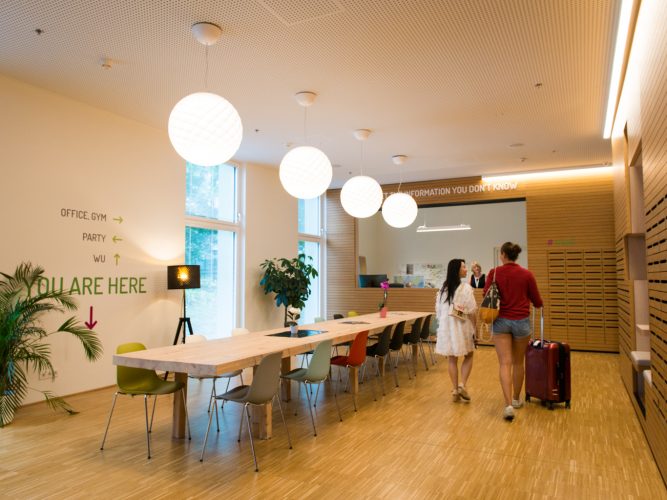Studying abroad is an absolute must for the vast majority of students. But before you start, there’s a lot to plan and organise, whether it’s for a Bachelor’s or Master’s degree. In addition to the country and the foreign universities, you also have to deal with the costs of studying abroad. But with our tips and information, you’ll be well prepared for your studies abroad. Then it’s time to pack your bags and get going.
Studying abroad means that you spend a certain amount of time in another country and study at a university abroad. There are various options to choose from. Which option is best for you depends on your motivation and your interests in studying abroad:
First of all, you should be clear about the length of your stay. Some students decide to spend one or two semesters abroad. Others complete their entire Bachelor’s or Master’s programme abroad. The main difference is that if you want to study your entire degree programme abroad, you have to apply to your local university. A semester abroad, on the other hand, is possible at almost every university.
Another important point: Think about where exactly you want to study. Studying abroad does not automatically mean that you have to travel the big wide world. Europe has more than enough to offer for most tastes and fields of study. And if you don’t want to go far away, find out about study opportunities in neighbouring countries. It is not for nothing that many German-speaking students are drawn to Austria to study abroad. Studying in Germany is also an option. If you’re still not sure, let our blog post inspire you: Popular countries for a semester abroad
Many students appreciate the funding opportunities for studying abroad. Another option is an internship abroad. This is especially recommended if you want to gain valuable work experience in an international environment.

Studying abroad is a great opportunity for personal development. You will be confronted with unfamiliar situations, which you will constantly grow from. You will benefit from your experience throughout your life. You will also improve your language skills and find your way in a new culture. Many students even develop close friendships abroad. It’s also a once-in-a-lifetime adventure that you’ll remember in your old age.
But studying abroad is not only an educational life experience, it also offers advantages when looking for a job. Some employers even require you to study abroad, regardless of whether you want to pursue a career in research or business. After all, experience abroad demonstrates intercultural competence, solid language skills and flexibility.

Do you have your Matura in the bag and want to get a breath of fresh air abroad? Then start planning everything around your studies abroad in good time. If you want to complete your entire Bachelor’s or Master’s degree in the form of a study abroad programme, you have to apply directly to the foreign university by the deadline. The deadlines sometimes even end a year before the actual start of your studies. Early planning is therefore a fundamental prerequisite for studying abroad after graduating from high school.
Also make sure that you meet the admission requirements for your desired degree programme and that you have all the essential documents for your stay. You will need the following for applying to or studying at a foreign university:
Please note: The requirements to be met in your case depend in particular on the university and the country.
Every stay abroad involves a lot of effort, even if it is only for a few months. It is important that you proceed in a structured manner from the very beginning. The following list will bring you closer to your dream of studying abroad, step by step:
First of all, think about the country you would like to live in. However, the location may be less important because you have a specific university or degree programme in mind. When making your choice, make sure that your studies abroad are recognised in your home country. In the case of a semester abroad, the courses should also be creditable. Even if the fun factor and the experience are in the foreground for many students – you should not forget your study progress.
Foreign universities have different application deadlines and admission procedures. You need to check the application procedure for each university individually. Notarised documents, as well as other official documents, often require a longer waiting period.
The question of accommodation for your study abroad programme is difficult to answer from a distance. Viewings are not possible because of the distance, and free, inexpensive flats are quickly snapped up. Some students book accommodation for the first few weeks and look for a suitable place to stay locally.
Another popular option is to move into a student hall of residence. Here you can meet people from all over the world who are in the same situation as you. Contacts are quickly made and it’s even more fun to live together. MILESTONE flats all over Europe score points with an easy online booking system and a 360° view. This way you can see for yourself the quality of the furnishings and the living comfort.

Have you secured your place at university? Then remember to take care of the other important documents in good time. If you are an EU citizen studying outside of Europe, you may have to apply for a visa or provide confirmation of your financial situation. In any case, the processing can take a while. If you have any questions about this, the study counselling service is also available to help you.
A semester abroad is an expensive affair. In addition to expenses for accommodation and free time, you will also have to pay for travel. You may also have to pay more for food. All of this costs a lot of money. But that shouldn’t discourage you at all. Where there’s a will, there’s a way. And you don’t always have to look for a low-paid part-time job.
If you receive family allowance in Austria, you will also receive an international allowance while studying abroad. In this case, you should apply early in order to receive both allowances. Grants and scholarships are also a frequently used option to cover the costs of studying abroad. However, these vary from country to country.
In Austria, several scholarships are available for studying abroad. For example, you can receive a mobility scholarship if you are studying in the EEA or in Switzerland. You may also be entitled to a merit scholarship or a scholarship for gifted students. Programmes like Erasmus+ are designed to promote international exchange and training in other EU countries. Find out more about the benefits in our Erasmus Guide.
You probably already know that proper planning is an important prerequisite for a semester abroad. The following points will help you take the steps on time.
18 months in advance:
12 months before:
6 months in advance
One thing is certain: It’s worth the effort. Studying abroad brings enormous advantages and will give you unforgettable moments. The key is good planning, so that the anticipation prevails and everything works out. With this information, you are well prepared for your adventure abroad.